2022届高考英语二轮复习专题代词2课件(50张PPT)
文档属性
| 名称 | 2022届高考英语二轮复习专题代词2课件(50张PPT) | 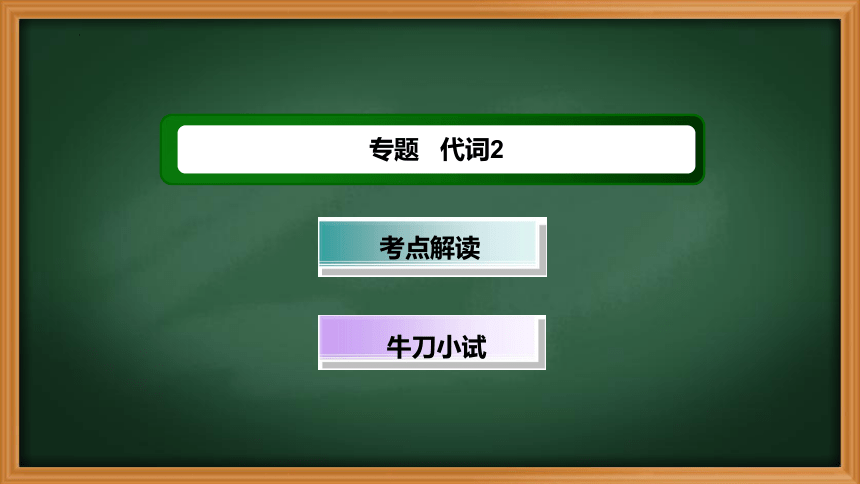 | |
| 格式 | zip | ||
| 文件大小 | 910.0KB | ||
| 资源类型 | 教案 | ||
| 版本资源 | 人教版(2019) | ||
| 科目 | 英语 | ||
| 更新时间 | 2022-04-16 23:15:01 | ||
图片预览

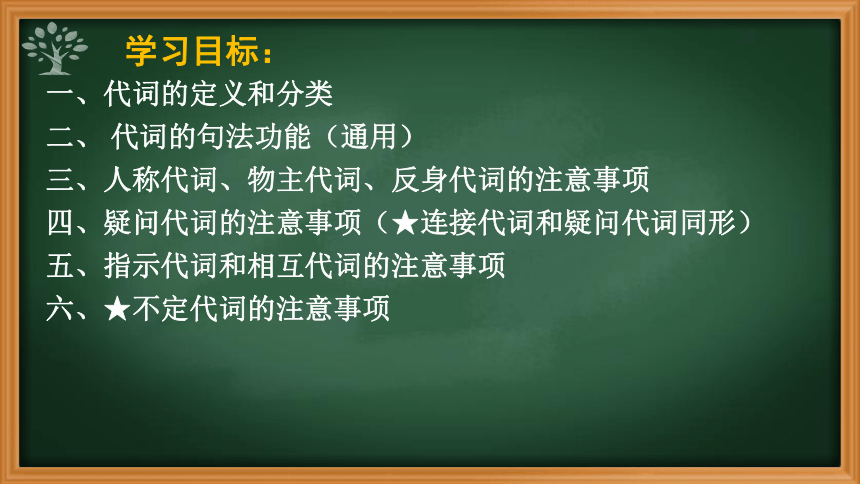
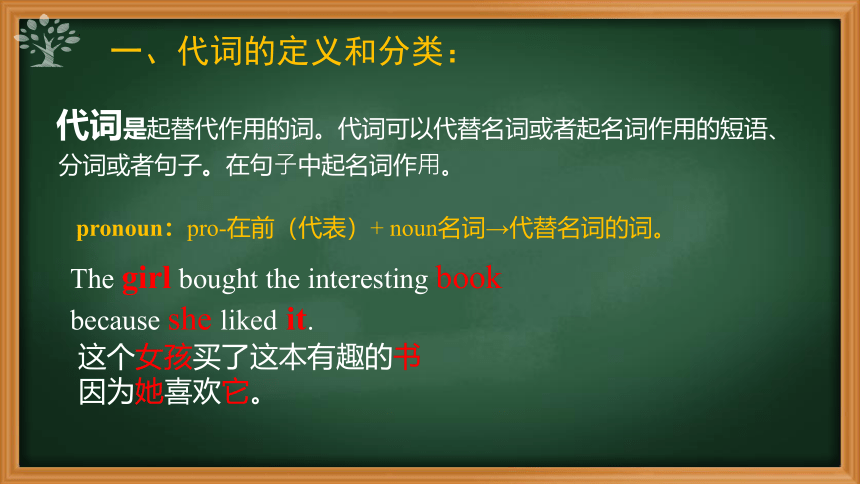
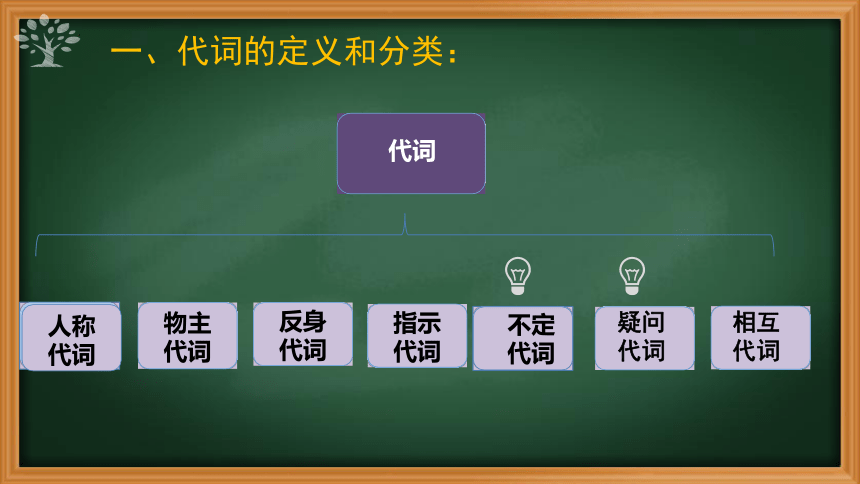
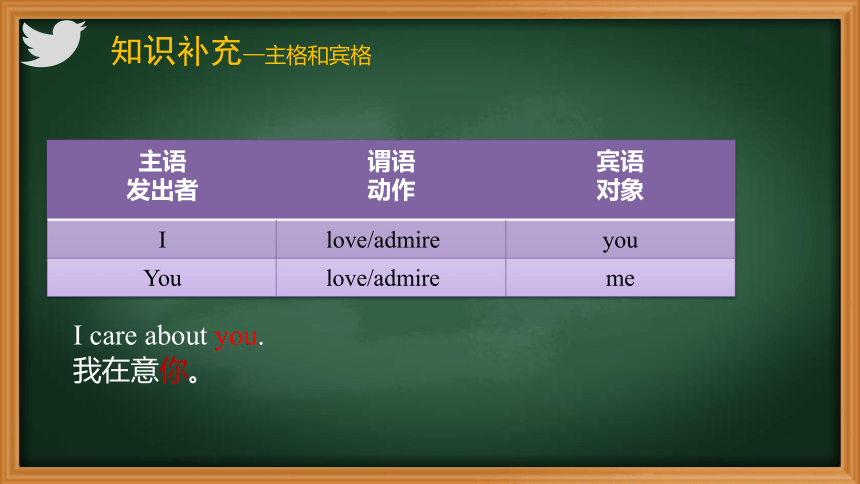
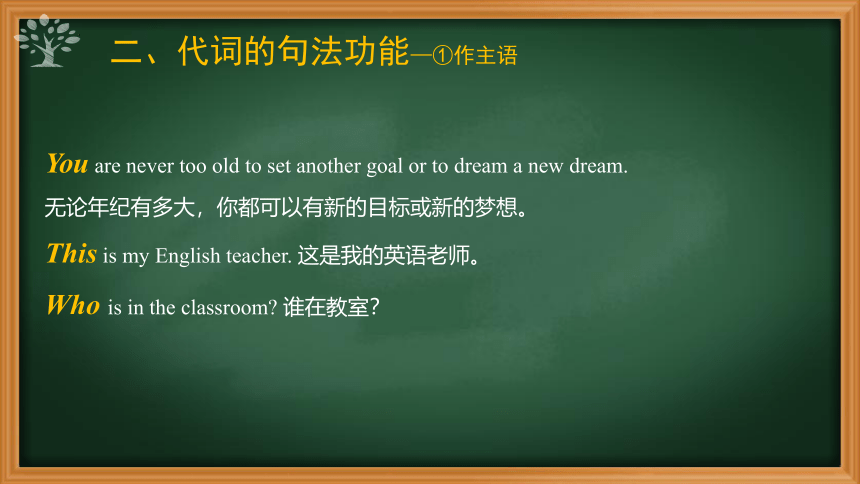
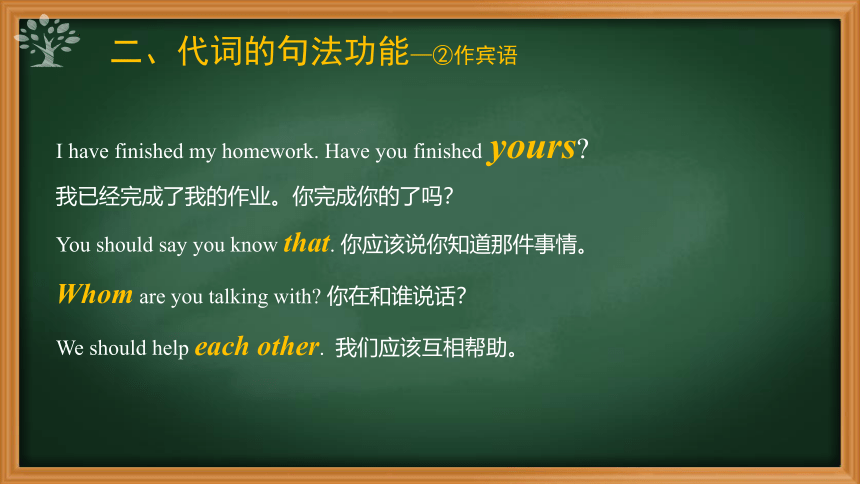
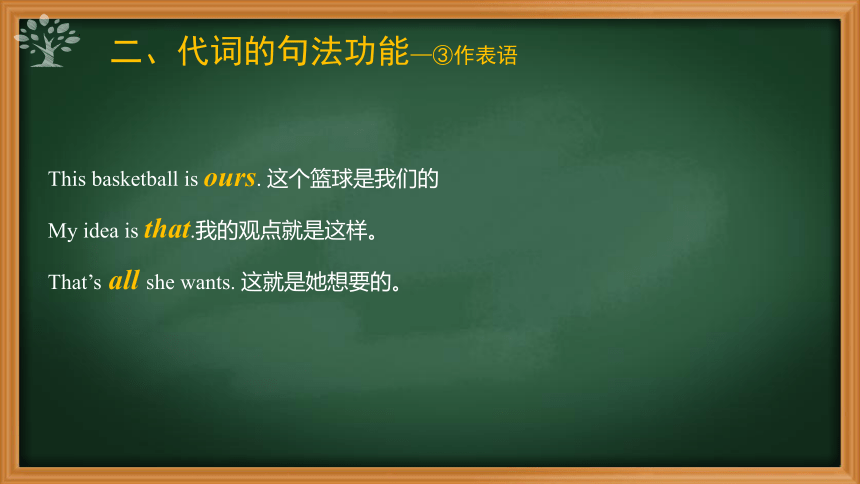
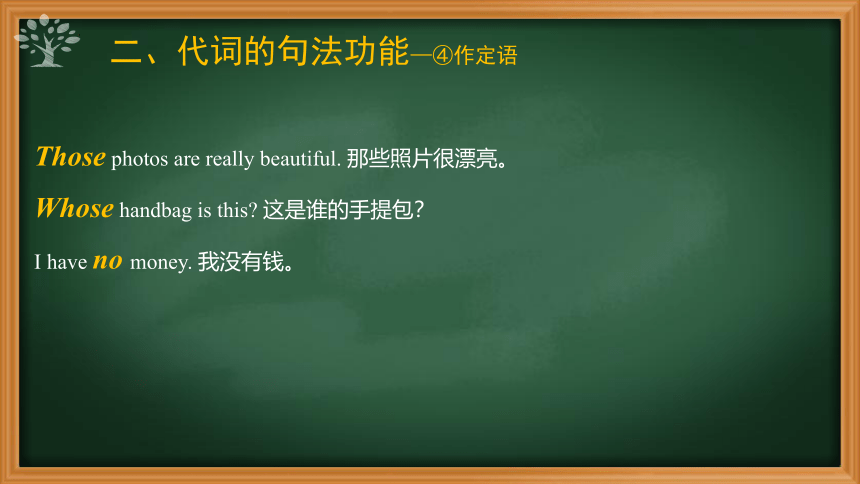
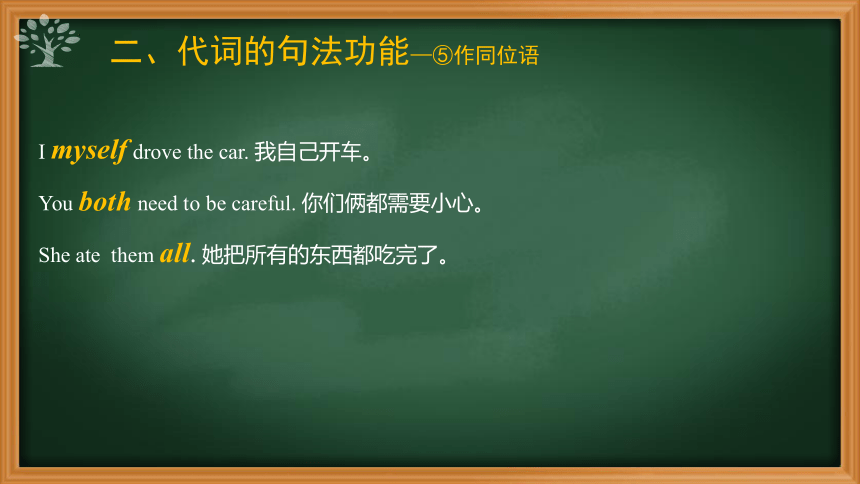
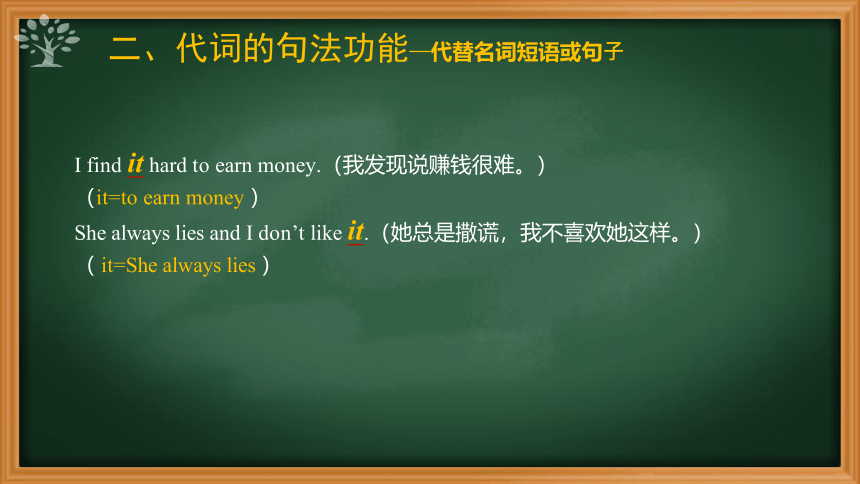
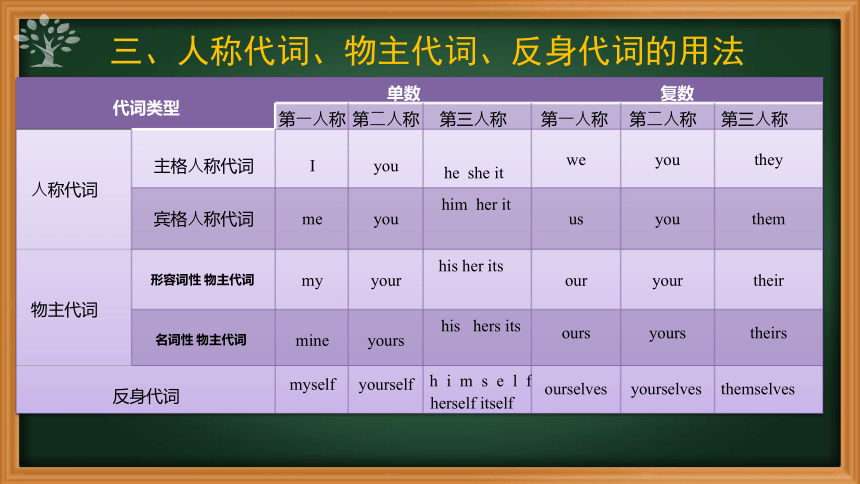
文档简介
(共50张PPT)
考点解读
牛刀小试
专题 代词2
一、代词的定义和分类
二、 代词的句法功能(通用)
三、人称代词、物主代词、反身代词的注意事项
四、疑问代词的注意事项(★连接代词和疑问代词同形)
五、指示代词和相互代词的注意事项
六、★不定代词的注意事项
学习目标:
代词是起替代作用的词。代词可以代替名词或者起名词作用的短语、
分词或者句子。在句 中起名词作 。
一、代词的定义和分类:
The girl bought the interesting book
because she liked it.
这个女孩买了这本有趣的书
因为她喜欢它。
pronoun:pro-在前(代表)+ noun名词→代替名词的词。
代词
人称
代词
物主 代词
反身
代词
指示 代词
不定 代词
疑问代词
相互代词
一、代词的定义和分类:
主语 发出者 谓语 动作 宾语
对象
I love/admire you
You love/admire me
I care about you.
我在意你。
知识补充—主格和宾格
二、代词的句法功能—①作主语
You are never too old to set another goal or to dream a new dream.
无论年纪有多大,你都可以有新的目标或新的梦想。
This is my English teacher. 这是我的英语老师。
Who is in the classroom 谁在教室?
二、代词的句法功能—②作宾语
I have finished my homework. Have you finished yours
我已经完成了我的作业。你完成你的了吗?
You should say you know that. 你应该说你知道那件事情。
Whom are you talking with 你在和谁说话?
We should help each other. 我们应该互相帮助。
二、代词的句法功能—③作表语
This basketball is ours. 这个篮球是我们的
My idea is that.我的观点就是这样。
That’s all she wants. 这就是她想要的。
二、代词的句法功能—④作定语
Those photos are really beautiful. 那些照片很漂亮。
Whose handbag is this 这是谁的手提包?
I have no money. 我没有钱。
二、代词的句法功能—⑤作同位语
I myself drove the car. 我自己开车。
You both need to be careful. 你们俩都需要小心。
She ate them all. 她把所有的东西都吃完了。
I find it hard to earn money.(我发现说赚钱很难。)
(it=to earn money )
She always lies and I don’t like it.(她总是撒谎,我不喜欢她这样。)
( it=She always lies )
二、代词的句法功能—代替名词短语或句
三、人称代词、物主代词、反身代词的用法
代词类型 单数 复数 第 称 第 称 第三 称 第 称 第 称 第三 称
称代词 主格 称代词 I you he she it we you
they
宾格 称代词 me you him her it us you
them
物主代词 形容词性 物主代词 my your his her its our your
their
名词性 物主代词 mine yours his hers its ours yours
theirs
反身代词 myself yourself himself herself itself ourselves yourselves
themselves
三、人称代词、物主代词、反身代词的用法
Jerry is a very cute boy. Jerry comes from London. Jerry has been in China for more than 10 years. Jerry is good at Chinese. Jerry’s friends like Jerry very much. Jerry is very strict with Jerry. But Jerry’s sister Lucy’s Chinese is not as good as Jerry’s, so Jerry always helps Lucy after class.
Jerry is a very cute boy. He comes from London. He has been in China for more than 10 years. He is good at Chinese. His friends like him very much. He is very strict with himself. But His sister Lucy’s Chinese is not as good as his , so he always helps her after class.
杰瑞是个非常可爱的男孩。杰瑞来自伦敦,杰瑞在中国呆了十多年了。杰瑞的汉语很好。杰瑞的朋友很喜欢他。杰瑞对杰瑞要求很严格。但是杰瑞妹妹露西的汉语不如杰瑞,因此杰瑞在课后总是帮助露西,
三、人称代词、物主代词的特殊用法
人们有时候称呼动物he或she。
Go and find the white cat and put her out.去找找那只白猫,把她放出去。
she 常用来指代雌性宠物,如cat,或与女性联系起来的事物,如 motherland(祖国)、moon(月亮)。
也可以用she来指国家,但在现代英语中it更为普遍。如:
France has decided to increase its trade with Romania.(her trade)
法国决定增加它对罗马尼亚的贸易额。
三、人称代词的注意事项—it 的用法(基本用法)
(1)指代某样东西。
She gave me a car as a birthday present, but it was a used car.
她送给我一辆车作为生日礼物,但那是一辆二手车。
(2)指代抽象事物。
He dislikes the way his mother talks, but he won’t admit it.
他不喜欢他妈妈说话的方式,不过他不会承认的。
(3)指代不知道性别的孩子或者大人。
What a lovely baby! Is it a girl 多漂亮的孩子啊!是女孩吗?
-Who is it (你是谁?) -It’s me. (是我。)
(4)指代某种感觉或者情况。
How is it going with you 你近来如何?
(5)指代某人 。
-Listen,someone is crying!(听,有人在哭。)
-It must be Marry. (那肯定是玛丽。)
(6)指代时间、日期、天气、环境、距离、金钱等
It’s five o’clock sharp. 现在五点整。
It’s a fine day today. 今天天气晴朗。
人称代词的注意事项—it 的用法(基本用法)
常见的用it指代句中成分的句式 用法 常用结构 例句
it代替不定式 或短语 It is/was +形容词(+for /of sb.)+不定式 It is very important to prove its authority.
证明其权威性是非常重要的。
it代替动名词 或短语 It is no good / no use / a waste of time /useless worthwhile+动名词 It is worthwhile making a third try.
做第三次尝试是值得的。
it 代替名词性 从句 该结构中的名词性从句 可用that、what、when、 whether等 It is not known yet when she left home.
她几点离开家的目前还不清楚。
人称代词的注意事项—it 的用法(基本用法)
人称 单数+self 复数+selves
第一人称 我自己myself 我们自己ourselves
第二人称 你自己yourself 你们自己yourselves
第三人称 他自己himself 他们自己themselves
她自己herself 她们自己themselves
它自己itself 它们自己themselves
三、反身代词的注意事项
三、物主代词注意事项
翻译:你的房子比我的大。
Your house is bigger than my.
Your house is bigger than mine.
你的房子比我的(房子)大。
形容词性物主代词:作形容词用,后必须跟名词.
名词性物主代词:作名词用,后面不能跟其他的名词
三、反身代词的注意事项
翻译: 我自己去了图书馆。
Myself went to the library.
I Myself went to the library.
★反身代词不可以单独做主语,
但是可以作主语同位语,
放在主语后或者句末。
★反身代词本身不能单独作主语,但在由and、or、but、neither、no连接的两个并列主语
中,第二个主语可以用反身代词,尤其是 myself或ourselves。
翻译:我妻子和我自己都不能参加你的结婚宴会了。
My wife and myself couldn’t attend your wedding party.
by oneself 独自
for oneself 为自己
teach oneself 自学
enjoy oneself 玩得愉快
Calm yourself down, please. 请冷静一点。
I could not dress myself up at that time. 那个时候我不能打扮我自己。
Please help yourself to some fish. 请你随便吃点鱼。
三、反身代词的注意事项
四、疑问代词的注意事项
疑问词:疑问代词+疑问副词
疑问代词:5个
疑问代词 含义 句子成分
who 谁 主语、宾语、表语
whom 谁 宾语
whose 谁的 定语、主语、表语、宾语
what 什么 主语、宾语、表语、定语
which 哪一个 (强调选择范围) 主语、宾语、表语、定语
四、疑问代词的注意事项
疑问代词是表示疑问的代词。在句子中做疑问词,用来构成特殊疑问句。
(1)疑问代词没有单数和复数之分。
Who is going to do laundry 谁要去洗衣服?(who表示单数)
What are there in the farm 农场里有什么?(what表示复数,指物品)
(2)疑问代词一般没有修饰语,但是可以与ever连用,用来加强语气
I hate whoever lies. 我痛恨任何一个说谎的人。
(3)疑问代词与else连用,表示“还有”。
Who else could speak French 还有谁能讲法语?
(3)疑问代词还可以引导一个间接疑问句,也就是一个从句。在句中可 用作从句的主语、宾语、表语等成分。
【做主语】What you should do is to keep quiet. 你该做的就是保持沉默。
【做宾语】I know whom he is waiting for. 我知道他在等谁。
后期课程详解
四、疑问代词的注意事项
五、指示代词和相互代词的用法
指示代词
相互代词
相互代词表示相互关系。
包括:each other和one another。
指示代词,是用来指示或标识人或事物的代词。
包括:this这个、that那个、
these这些、those那些。
五、指示代词的注意事项
1. 承上启下:that和those还可以指前文中提到的事物,有承上的作用。
this和these指下文中将要提到的人或物,有启下的作用。
【承上】She was ill. That’s why she missed the meeting. 她病了,这就是她没
参加会议的原因。
【启下】What I want to show you is this: my honesty is without question.
我想展示给你的是这个:我的诚实是不用怀疑的。
五、指示代词的注意事项
2. 指示代词分单数(this/that)和复数(these/those)两种形式,既可作限定词又可作代词。
【限定词】This boy is Peter. 这个男孩是彼得。
Those women are my teachers. 那些女人是我的老师。
【代词】This is Chris. 这是克里斯。
Those are my students. 那些是我的学生。
五、指示代词的注意事项
that和those可作定语从句的先行词,但this和 these不能。
在作先行词时,只有 those可指人。
He liked that which looked beautiful. 他喜欢外表漂亮的那个东西。(that指物)
He liked those which looked beautiful. 他喜欢那些外表漂亮的东西。( those指物)
He liked those who looked beautiful. 他喜欢那些外表漂亮的人。(those指人)
后期课程详解
限定词(determiner,简称det.):不属于 词性之 ,只是限定名词范围的 类词的统称。包 括:
冠词
指示代词
物主代词
形容词性
物主代词
不定代词
★注意:以上所有的限定词每次只能 个。
不能出现this my book,my the book等。
记忆锦囊—限定词
1. 冠词:I want to buy a dress.(我想买一件裙子。)
2. 指示代词:I want to buy that dress. (我想买那件裙子)
3. 形容词性物主代词:
I can’t find my dress.(我找不到我的裙子了。)
4. 不定代词:
Do you have any dresses (你有裙子吗?)
记忆锦囊—限定词
五、指示代词的注意事项—that
例1:Who told her that (谁告诉她那件事的?)(代词作直接宾语)
例2:The test won’t be that easy.(测试不会那么容易的。)(副词作程度状语)
例3:The output of masks this year has increased by 90% compared with that of last year.(今年口罩 产量 去年(的)增 了百分之90。)(代词作宾语)
例4:He expressed the hope that they would keep in touch with his firm.(他表示希望他们与他的公 司保持联系。)(连接词引导的同位语从句)
后期课程详解
区别 主格和宾格 所有格
两者之间 each other 相互 each other’s
彼此的
三者 或三者以上 one another 相互 one another’s
彼此的
五、相互代词的注意事项
一般认为 each other 指两者,one another指三者或三者以上。但在实际运用中,这两个短语常可互换:
We respect each other [one another]. 我们互相尊重 (对方)。
The sea and the sky seem to melt into one another [each other].
大海和蓝天似乎融为一体。
两者均有所有格:
They know each other’s [one another’s] weak points.
他们都彼此了解对方的缺点。
五、相互代词的注意事项—相同点
3. each other 可拆开用 (each…the other),而 one another则不能:
We helped each other. =We each helped the other. 我们互相帮助。
4. 汉语的“互相”是副词,但是英语中的 each other 和 one another均为代词,因此在及物动词之后可直接用作宾语 (如help each other);而在不及物动词之后,则要借助介词 (如talk to each other, learn from one another 等)。
5. 这两个短语均不能用作主语:
正:We each know what the other thinks.
误:We know what each other [one another] thinks.
★正因为不能用作主语,所以用它们作宾语的句子不能改为被动语态。
五、相互代词的注意事项
六、不定代词的注意事项
不定代词的分类 由body、one、 thing构成的 合成代词 somebody anybody everybody nobody
someone anyone everyone no one
something anything everything nothing
兼作代词 和限定词的词 (可以做名词或者形容词) all another any both
either neither little few
many much each some
other none
注意事项 every和no只能做定语 没有明确指定,而用来指代名词或形容词的词,叫做不定代词。不定代词通常表示不确定的人、事物或模糊的数量。
1.-Would you like something to eat,Jiaozi or Zongzi?
-Either will do.
-你偏好饺子还是粽子?-随便哪一样都可以。
Neither of us speaks English.
我们两个都不说英语。
You can take both of them.
你两个都可以拿去。
其他不定代词 either 两者中任一+谓语动词单数
两者中每一+谓语动词单数
neither 两者中无一+谓语动词单数
both 两者都+谓语动词复数
六、不定代词的注意事项
Either of与both of 注意区别两者的意思,不同的意思,单复数不一样.
① There are two apples on the table; you can take either of them.
② There are two apples on the table; you can take both of them.
③ There are trees on either side of the street.
④ There are trees on both sides of the street.
桌上有两只苹果,随你拿哪一只。
桌上有两只苹果,你可以把两只都拿去。
街的两边绿树成荫。
牛刀小试
街的两边(每一边)绿树成荫。
You may buy any of the three.
你可以在三者中买其中任一个。
2. He did not like any of the photos.
这些照片中他一个都不喜欢。
3. None of my classmates likes English.
我的同学中没有一个喜欢英语。
4. All of us can help you.
我们所有的人都能帮你。
其他不定代词 any 三者以上任一
none 三者以上无一
all 三者以上全部
六、不定代词的注意事项
any (否定句中 )表示 “一些” any of 表示突出“集体中的任何个体”、“ 个也不”)
any 用在肯定句中表示“任何”.
例1:Anything is possible.( 切皆有可能。)( 切)
例2:If you have any problems, don’t hesitate to ask me.(如果你有任何问题,别犹豫,直接问 我。)(任何)
Each says the other is a thief.、
每个人都说对方是个小偷。
Every one must finish the assignment.
每个人都必须完成任务。
其他不定代词 each 每一个 (人或物) every
每一个
①不可单独使用
②着重个别 ②着重全体
五、不定代词的注意事项
①可单独使用
We have two cups of tea;one is hot, and the other is cold.
我们有两杯茶;一杯是热的,另一杯是凉的的。
I finished one cup of coffee and then asked
for another.
我喝完了一杯咖啡,并且然后又要了另 一杯。
其他不定代词 other 其他 another
另一个
①用于两者之间 ①用于三者或以上
②+单复数名词 或one/ones ②+单数名词
或one
五、不定代词的注意事项
常见的不定代词 someone 某人 anyone 任何人 everyone 每个人 no one
没有人
somebody 某人 anybody 任何人 everybody 每个人 nobody
没有人
something 某事物 anything 任何事物 everything 一切事物 nothing
没有任何事物
复合代词在句中可用作主语、宾语或表语,但不能用作定语。
肯定句
否定句、
疑问句或条件句
五、不定代词的注意事项—复合代词
1. 复合不定代词受定语修饰时,定语应放在它们后面:
I want to learn something easy. 我想学点简单的东西。
Have you seen anyone [anybody] famous 你见过名人吗
为何要定语后置?
①不定代词本身就是“形容词/限定词+名词”的合成词,比如some 和any已经占用了前置定语的位置。
②可以理解为从句(that is)
五、不定代词的注意事项—复合代词
2. 指人的复合不定代词若用作主语,其谓语动词一般用单数,相应的人称代词和物主代词也用单数 he, him, his (不一定指男性)。
但在非正式文体中常用复数代词 they, them, their:
Everyone knows this, doesn’t he [don’t they]? 人人都知道这一点,不是吗
If anybody [anyone] comes, ask him [them] to wait. 要是有人来,让他等着。
五、不定代词的注意事项
3. anyone, everyone 等只能指人,不能指物,且其后一般不接of 短语。若是指物或后接 of 短语,可用 any one, every one (分开写):
any one of the boys 男孩子们当中的任何一个
any one of the books 书当中的任何一个
every one of the students 每一个学生
every one of the schools 每一所学校
五、不定代词的注意事项—复合代词
①no可以用做限定词/形容词“没有”,相当于not any:
No news is good news. 没有消息也许就是最好的消息。
He has no car. 他没有车。
No parking. 禁 停车。
②no的感情更强烈。对 :
She’s not a student.(她不是 个学生。)(客观陈述)
She’s no student. (她才不是学生。)(突出感情)
五、不定代词的注意事项
牛刀小试
Catherine bought a postcard of the place she was visiting, addressed
________ to ________ and then posted it at the nearby post office.
A.it; her B.it; herself C.herself ; her D. herself ; herself
〖答案〗B
〖考点〗考查代词的用法。
〖解析〗address作动词的意思是 “在……上写姓名住址”, addressed后接it, 作直接
宾语, 代替上文中的postcard。to后接herself,作间接宾语, 表示把postcard
寄给她自己。
You may drop in or just give me a call. ______ will do.
A.Either B.Each C.Neither D.All
〖答案〗A
〖解析〗either用作代词, 意为 “(两者之中)任一、任何一个”。根据所提供的情
景You may drop in or just give me a call.可判断出只有两种可能性, 其中的任
何一种都是可以的。each和all都表示多于两个可能性, 与提供的情景不相符
合。neither意为 “两者都不”。
牛刀小试
I hear _____ boys in your school like playing football in their spare
time, though others prefer basketball.
A. quite a lot B. quite a few C. quite a bit D. quite a little
〖答案〗B
〖解析〗由于boys为复数可数名词, 所以用a few修饰; 若用a lot, 则应改为a lot of。
注意:quite a few的意思是 “相当多” “不少”, 不是 “相当少”, 如:Quite a few
people came to the lecture. 有相当多的人来听讲。We drank quite a lot of
wine. 我们喝了不少葡萄酒。
牛刀小试
If you can’t decide which of the two books to borrow, why don’t you
take ______ I won’t read them this week.
A. all B. any C. either D. both
〖答案〗D
〖解析〗这道题首先要弄清前后句的逻辑关系。根据后一句 “这周我不读(这两本
书)”, 含义是你可拿走。表示 “都”的意思的是both和all, 但是由于是两本
书, 所以用both。
牛刀小试
温
示
提
馨
本节结束,谢谢观看!
考点解读
牛刀小试
专题 代词2
一、代词的定义和分类
二、 代词的句法功能(通用)
三、人称代词、物主代词、反身代词的注意事项
四、疑问代词的注意事项(★连接代词和疑问代词同形)
五、指示代词和相互代词的注意事项
六、★不定代词的注意事项
学习目标:
代词是起替代作用的词。代词可以代替名词或者起名词作用的短语、
分词或者句子。在句 中起名词作 。
一、代词的定义和分类:
The girl bought the interesting book
because she liked it.
这个女孩买了这本有趣的书
因为她喜欢它。
pronoun:pro-在前(代表)+ noun名词→代替名词的词。
代词
人称
代词
物主 代词
反身
代词
指示 代词
不定 代词
疑问代词
相互代词
一、代词的定义和分类:
主语 发出者 谓语 动作 宾语
对象
I love/admire you
You love/admire me
I care about you.
我在意你。
知识补充—主格和宾格
二、代词的句法功能—①作主语
You are never too old to set another goal or to dream a new dream.
无论年纪有多大,你都可以有新的目标或新的梦想。
This is my English teacher. 这是我的英语老师。
Who is in the classroom 谁在教室?
二、代词的句法功能—②作宾语
I have finished my homework. Have you finished yours
我已经完成了我的作业。你完成你的了吗?
You should say you know that. 你应该说你知道那件事情。
Whom are you talking with 你在和谁说话?
We should help each other. 我们应该互相帮助。
二、代词的句法功能—③作表语
This basketball is ours. 这个篮球是我们的
My idea is that.我的观点就是这样。
That’s all she wants. 这就是她想要的。
二、代词的句法功能—④作定语
Those photos are really beautiful. 那些照片很漂亮。
Whose handbag is this 这是谁的手提包?
I have no money. 我没有钱。
二、代词的句法功能—⑤作同位语
I myself drove the car. 我自己开车。
You both need to be careful. 你们俩都需要小心。
She ate them all. 她把所有的东西都吃完了。
I find it hard to earn money.(我发现说赚钱很难。)
(it=to earn money )
She always lies and I don’t like it.(她总是撒谎,我不喜欢她这样。)
( it=She always lies )
二、代词的句法功能—代替名词短语或句
三、人称代词、物主代词、反身代词的用法
代词类型 单数 复数 第 称 第 称 第三 称 第 称 第 称 第三 称
称代词 主格 称代词 I you he she it we you
they
宾格 称代词 me you him her it us you
them
物主代词 形容词性 物主代词 my your his her its our your
their
名词性 物主代词 mine yours his hers its ours yours
theirs
反身代词 myself yourself himself herself itself ourselves yourselves
themselves
三、人称代词、物主代词、反身代词的用法
Jerry is a very cute boy. Jerry comes from London. Jerry has been in China for more than 10 years. Jerry is good at Chinese. Jerry’s friends like Jerry very much. Jerry is very strict with Jerry. But Jerry’s sister Lucy’s Chinese is not as good as Jerry’s, so Jerry always helps Lucy after class.
Jerry is a very cute boy. He comes from London. He has been in China for more than 10 years. He is good at Chinese. His friends like him very much. He is very strict with himself. But His sister Lucy’s Chinese is not as good as his , so he always helps her after class.
杰瑞是个非常可爱的男孩。杰瑞来自伦敦,杰瑞在中国呆了十多年了。杰瑞的汉语很好。杰瑞的朋友很喜欢他。杰瑞对杰瑞要求很严格。但是杰瑞妹妹露西的汉语不如杰瑞,因此杰瑞在课后总是帮助露西,
三、人称代词、物主代词的特殊用法
人们有时候称呼动物he或she。
Go and find the white cat and put her out.去找找那只白猫,把她放出去。
she 常用来指代雌性宠物,如cat,或与女性联系起来的事物,如 motherland(祖国)、moon(月亮)。
也可以用she来指国家,但在现代英语中it更为普遍。如:
France has decided to increase its trade with Romania.(her trade)
法国决定增加它对罗马尼亚的贸易额。
三、人称代词的注意事项—it 的用法(基本用法)
(1)指代某样东西。
She gave me a car as a birthday present, but it was a used car.
她送给我一辆车作为生日礼物,但那是一辆二手车。
(2)指代抽象事物。
He dislikes the way his mother talks, but he won’t admit it.
他不喜欢他妈妈说话的方式,不过他不会承认的。
(3)指代不知道性别的孩子或者大人。
What a lovely baby! Is it a girl 多漂亮的孩子啊!是女孩吗?
-Who is it (你是谁?) -It’s me. (是我。)
(4)指代某种感觉或者情况。
How is it going with you 你近来如何?
(5)指代某人 。
-Listen,someone is crying!(听,有人在哭。)
-It must be Marry. (那肯定是玛丽。)
(6)指代时间、日期、天气、环境、距离、金钱等
It’s five o’clock sharp. 现在五点整。
It’s a fine day today. 今天天气晴朗。
人称代词的注意事项—it 的用法(基本用法)
常见的用it指代句中成分的句式 用法 常用结构 例句
it代替不定式 或短语 It is/was +形容词(+for /of sb.)+不定式 It is very important to prove its authority.
证明其权威性是非常重要的。
it代替动名词 或短语 It is no good / no use / a waste of time /useless worthwhile+动名词 It is worthwhile making a third try.
做第三次尝试是值得的。
it 代替名词性 从句 该结构中的名词性从句 可用that、what、when、 whether等 It is not known yet when she left home.
她几点离开家的目前还不清楚。
人称代词的注意事项—it 的用法(基本用法)
人称 单数+self 复数+selves
第一人称 我自己myself 我们自己ourselves
第二人称 你自己yourself 你们自己yourselves
第三人称 他自己himself 他们自己themselves
她自己herself 她们自己themselves
它自己itself 它们自己themselves
三、反身代词的注意事项
三、物主代词注意事项
翻译:你的房子比我的大。
Your house is bigger than my.
Your house is bigger than mine.
你的房子比我的(房子)大。
形容词性物主代词:作形容词用,后必须跟名词.
名词性物主代词:作名词用,后面不能跟其他的名词
三、反身代词的注意事项
翻译: 我自己去了图书馆。
Myself went to the library.
I Myself went to the library.
★反身代词不可以单独做主语,
但是可以作主语同位语,
放在主语后或者句末。
★反身代词本身不能单独作主语,但在由and、or、but、neither、no连接的两个并列主语
中,第二个主语可以用反身代词,尤其是 myself或ourselves。
翻译:我妻子和我自己都不能参加你的结婚宴会了。
My wife and myself couldn’t attend your wedding party.
by oneself 独自
for oneself 为自己
teach oneself 自学
enjoy oneself 玩得愉快
Calm yourself down, please. 请冷静一点。
I could not dress myself up at that time. 那个时候我不能打扮我自己。
Please help yourself to some fish. 请你随便吃点鱼。
三、反身代词的注意事项
四、疑问代词的注意事项
疑问词:疑问代词+疑问副词
疑问代词:5个
疑问代词 含义 句子成分
who 谁 主语、宾语、表语
whom 谁 宾语
whose 谁的 定语、主语、表语、宾语
what 什么 主语、宾语、表语、定语
which 哪一个 (强调选择范围) 主语、宾语、表语、定语
四、疑问代词的注意事项
疑问代词是表示疑问的代词。在句子中做疑问词,用来构成特殊疑问句。
(1)疑问代词没有单数和复数之分。
Who is going to do laundry 谁要去洗衣服?(who表示单数)
What are there in the farm 农场里有什么?(what表示复数,指物品)
(2)疑问代词一般没有修饰语,但是可以与ever连用,用来加强语气
I hate whoever lies. 我痛恨任何一个说谎的人。
(3)疑问代词与else连用,表示“还有”。
Who else could speak French 还有谁能讲法语?
(3)疑问代词还可以引导一个间接疑问句,也就是一个从句。在句中可 用作从句的主语、宾语、表语等成分。
【做主语】What you should do is to keep quiet. 你该做的就是保持沉默。
【做宾语】I know whom he is waiting for. 我知道他在等谁。
后期课程详解
四、疑问代词的注意事项
五、指示代词和相互代词的用法
指示代词
相互代词
相互代词表示相互关系。
包括:each other和one another。
指示代词,是用来指示或标识人或事物的代词。
包括:this这个、that那个、
these这些、those那些。
五、指示代词的注意事项
1. 承上启下:that和those还可以指前文中提到的事物,有承上的作用。
this和these指下文中将要提到的人或物,有启下的作用。
【承上】She was ill. That’s why she missed the meeting. 她病了,这就是她没
参加会议的原因。
【启下】What I want to show you is this: my honesty is without question.
我想展示给你的是这个:我的诚实是不用怀疑的。
五、指示代词的注意事项
2. 指示代词分单数(this/that)和复数(these/those)两种形式,既可作限定词又可作代词。
【限定词】This boy is Peter. 这个男孩是彼得。
Those women are my teachers. 那些女人是我的老师。
【代词】This is Chris. 这是克里斯。
Those are my students. 那些是我的学生。
五、指示代词的注意事项
that和those可作定语从句的先行词,但this和 these不能。
在作先行词时,只有 those可指人。
He liked that which looked beautiful. 他喜欢外表漂亮的那个东西。(that指物)
He liked those which looked beautiful. 他喜欢那些外表漂亮的东西。( those指物)
He liked those who looked beautiful. 他喜欢那些外表漂亮的人。(those指人)
后期课程详解
限定词(determiner,简称det.):不属于 词性之 ,只是限定名词范围的 类词的统称。包 括:
冠词
指示代词
物主代词
形容词性
物主代词
不定代词
★注意:以上所有的限定词每次只能 个。
不能出现this my book,my the book等。
记忆锦囊—限定词
1. 冠词:I want to buy a dress.(我想买一件裙子。)
2. 指示代词:I want to buy that dress. (我想买那件裙子)
3. 形容词性物主代词:
I can’t find my dress.(我找不到我的裙子了。)
4. 不定代词:
Do you have any dresses (你有裙子吗?)
记忆锦囊—限定词
五、指示代词的注意事项—that
例1:Who told her that (谁告诉她那件事的?)(代词作直接宾语)
例2:The test won’t be that easy.(测试不会那么容易的。)(副词作程度状语)
例3:The output of masks this year has increased by 90% compared with that of last year.(今年口罩 产量 去年(的)增 了百分之90。)(代词作宾语)
例4:He expressed the hope that they would keep in touch with his firm.(他表示希望他们与他的公 司保持联系。)(连接词引导的同位语从句)
后期课程详解
区别 主格和宾格 所有格
两者之间 each other 相互 each other’s
彼此的
三者 或三者以上 one another 相互 one another’s
彼此的
五、相互代词的注意事项
一般认为 each other 指两者,one another指三者或三者以上。但在实际运用中,这两个短语常可互换:
We respect each other [one another]. 我们互相尊重 (对方)。
The sea and the sky seem to melt into one another [each other].
大海和蓝天似乎融为一体。
两者均有所有格:
They know each other’s [one another’s] weak points.
他们都彼此了解对方的缺点。
五、相互代词的注意事项—相同点
3. each other 可拆开用 (each…the other),而 one another则不能:
We helped each other. =We each helped the other. 我们互相帮助。
4. 汉语的“互相”是副词,但是英语中的 each other 和 one another均为代词,因此在及物动词之后可直接用作宾语 (如help each other);而在不及物动词之后,则要借助介词 (如talk to each other, learn from one another 等)。
5. 这两个短语均不能用作主语:
正:We each know what the other thinks.
误:We know what each other [one another] thinks.
★正因为不能用作主语,所以用它们作宾语的句子不能改为被动语态。
五、相互代词的注意事项
六、不定代词的注意事项
不定代词的分类 由body、one、 thing构成的 合成代词 somebody anybody everybody nobody
someone anyone everyone no one
something anything everything nothing
兼作代词 和限定词的词 (可以做名词或者形容词) all another any both
either neither little few
many much each some
other none
注意事项 every和no只能做定语 没有明确指定,而用来指代名词或形容词的词,叫做不定代词。不定代词通常表示不确定的人、事物或模糊的数量。
1.-Would you like something to eat,Jiaozi or Zongzi?
-Either will do.
-你偏好饺子还是粽子?-随便哪一样都可以。
Neither of us speaks English.
我们两个都不说英语。
You can take both of them.
你两个都可以拿去。
其他不定代词 either 两者中任一+谓语动词单数
两者中每一+谓语动词单数
neither 两者中无一+谓语动词单数
both 两者都+谓语动词复数
六、不定代词的注意事项
Either of与both of 注意区别两者的意思,不同的意思,单复数不一样.
① There are two apples on the table; you can take either of them.
② There are two apples on the table; you can take both of them.
③ There are trees on either side of the street.
④ There are trees on both sides of the street.
桌上有两只苹果,随你拿哪一只。
桌上有两只苹果,你可以把两只都拿去。
街的两边绿树成荫。
牛刀小试
街的两边(每一边)绿树成荫。
You may buy any of the three.
你可以在三者中买其中任一个。
2. He did not like any of the photos.
这些照片中他一个都不喜欢。
3. None of my classmates likes English.
我的同学中没有一个喜欢英语。
4. All of us can help you.
我们所有的人都能帮你。
其他不定代词 any 三者以上任一
none 三者以上无一
all 三者以上全部
六、不定代词的注意事项
any (否定句中 )表示 “一些” any of 表示突出“集体中的任何个体”、“ 个也不”)
any 用在肯定句中表示“任何”.
例1:Anything is possible.( 切皆有可能。)( 切)
例2:If you have any problems, don’t hesitate to ask me.(如果你有任何问题,别犹豫,直接问 我。)(任何)
Each says the other is a thief.、
每个人都说对方是个小偷。
Every one must finish the assignment.
每个人都必须完成任务。
其他不定代词 each 每一个 (人或物) every
每一个
①不可单独使用
②着重个别 ②着重全体
五、不定代词的注意事项
①可单独使用
We have two cups of tea;one is hot, and the other is cold.
我们有两杯茶;一杯是热的,另一杯是凉的的。
I finished one cup of coffee and then asked
for another.
我喝完了一杯咖啡,并且然后又要了另 一杯。
其他不定代词 other 其他 another
另一个
①用于两者之间 ①用于三者或以上
②+单复数名词 或one/ones ②+单数名词
或one
五、不定代词的注意事项
常见的不定代词 someone 某人 anyone 任何人 everyone 每个人 no one
没有人
somebody 某人 anybody 任何人 everybody 每个人 nobody
没有人
something 某事物 anything 任何事物 everything 一切事物 nothing
没有任何事物
复合代词在句中可用作主语、宾语或表语,但不能用作定语。
肯定句
否定句、
疑问句或条件句
五、不定代词的注意事项—复合代词
1. 复合不定代词受定语修饰时,定语应放在它们后面:
I want to learn something easy. 我想学点简单的东西。
Have you seen anyone [anybody] famous 你见过名人吗
为何要定语后置?
①不定代词本身就是“形容词/限定词+名词”的合成词,比如some 和any已经占用了前置定语的位置。
②可以理解为从句(that is)
五、不定代词的注意事项—复合代词
2. 指人的复合不定代词若用作主语,其谓语动词一般用单数,相应的人称代词和物主代词也用单数 he, him, his (不一定指男性)。
但在非正式文体中常用复数代词 they, them, their:
Everyone knows this, doesn’t he [don’t they]? 人人都知道这一点,不是吗
If anybody [anyone] comes, ask him [them] to wait. 要是有人来,让他等着。
五、不定代词的注意事项
3. anyone, everyone 等只能指人,不能指物,且其后一般不接of 短语。若是指物或后接 of 短语,可用 any one, every one (分开写):
any one of the boys 男孩子们当中的任何一个
any one of the books 书当中的任何一个
every one of the students 每一个学生
every one of the schools 每一所学校
五、不定代词的注意事项—复合代词
①no可以用做限定词/形容词“没有”,相当于not any:
No news is good news. 没有消息也许就是最好的消息。
He has no car. 他没有车。
No parking. 禁 停车。
②no的感情更强烈。对 :
She’s not a student.(她不是 个学生。)(客观陈述)
She’s no student. (她才不是学生。)(突出感情)
五、不定代词的注意事项
牛刀小试
Catherine bought a postcard of the place she was visiting, addressed
________ to ________ and then posted it at the nearby post office.
A.it; her B.it; herself C.herself ; her D. herself ; herself
〖答案〗B
〖考点〗考查代词的用法。
〖解析〗address作动词的意思是 “在……上写姓名住址”, addressed后接it, 作直接
宾语, 代替上文中的postcard。to后接herself,作间接宾语, 表示把postcard
寄给她自己。
You may drop in or just give me a call. ______ will do.
A.Either B.Each C.Neither D.All
〖答案〗A
〖解析〗either用作代词, 意为 “(两者之中)任一、任何一个”。根据所提供的情
景You may drop in or just give me a call.可判断出只有两种可能性, 其中的任
何一种都是可以的。each和all都表示多于两个可能性, 与提供的情景不相符
合。neither意为 “两者都不”。
牛刀小试
I hear _____ boys in your school like playing football in their spare
time, though others prefer basketball.
A. quite a lot B. quite a few C. quite a bit D. quite a little
〖答案〗B
〖解析〗由于boys为复数可数名词, 所以用a few修饰; 若用a lot, 则应改为a lot of。
注意:quite a few的意思是 “相当多” “不少”, 不是 “相当少”, 如:Quite a few
people came to the lecture. 有相当多的人来听讲。We drank quite a lot of
wine. 我们喝了不少葡萄酒。
牛刀小试
If you can’t decide which of the two books to borrow, why don’t you
take ______ I won’t read them this week.
A. all B. any C. either D. both
〖答案〗D
〖解析〗这道题首先要弄清前后句的逻辑关系。根据后一句 “这周我不读(这两本
书)”, 含义是你可拿走。表示 “都”的意思的是both和all, 但是由于是两本
书, 所以用both。
牛刀小试
温
示
提
馨
本节结束,谢谢观看!
